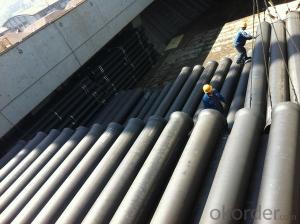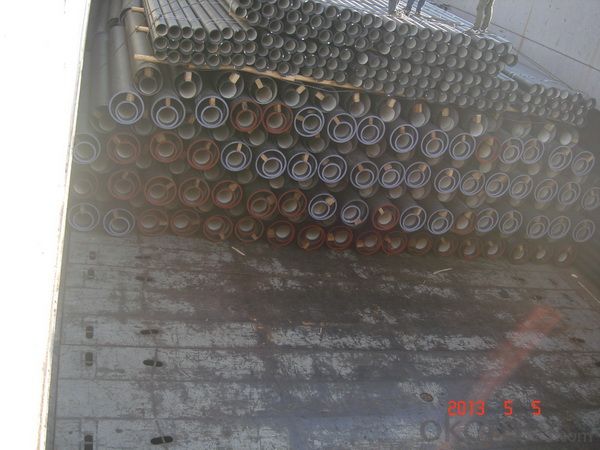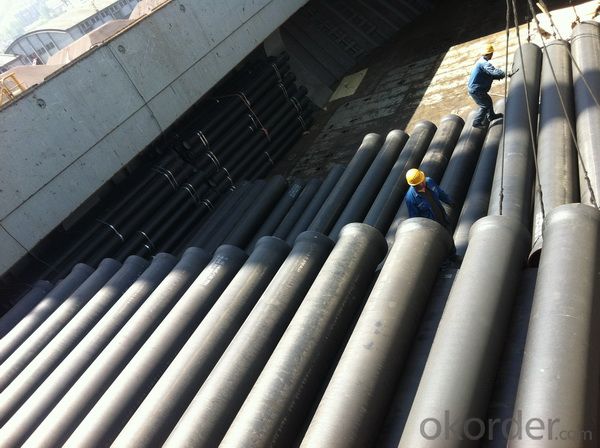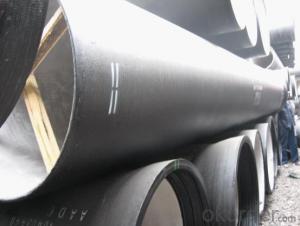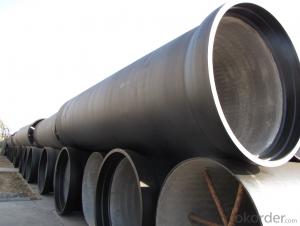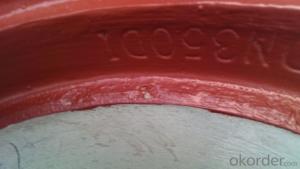K Type Ductile Iron Pipe DN300 Socket spigot pipe
- Loading Port:
- Tianjin
- Payment Terms:
- TT OR LC
- Min Order Qty:
- 200 m.t
- Supply Capability:
- 30000 m.t/month
OKorder Service Pledge
OKorder Financial Service
You Might Also Like
1) The standard of pipe: ISO2531:1998, EN545:2006,K9 K8
2) Effective length: 6m/5.7m
3) Inner cement line: Portland cement lineas per ISO4179
4) Zinc coating: at least 130g/m2 as per ISO8179
5) Bitumen painting: at least 70μm as per ISO8179
6)With 102% quantity of NBR, SBR, or EPDM ring asper ISO4633
7) DN80-DN1200
8) Highstrength, lighter than grey iron, good corrosion resistance, no furring, smallflow resistance, easy fixing, long life tome about 100 yeas
9)Checked by automatic inspection equipment
10) Composition:
Chemical composition | |||
Chemical composition | Ductile Cast Iron Pipe (%) | Grey iron pipe (%) | Steel pipe (%) |
C | 3.5-4.0 | 3.2-3.8 | 0.1-0.2 |
Si | 1.9-2.6 | 1.4-2.2 | 0.15-0.4 |
Mn | 0.15-0.45 | 0.4-0.6 | 0.3-0.6 |
P | ≤0.06 | ≤0.3 | 0.02-0.03 |
S | ≤0.02 | ≤0.1 | 0.02-0.03 |
Mg | 0.03-0.06 |
|
|
11) Feature:
Mechanical properties | |||
| Ductile Cast Iron Pipe | Grey Iron Pipe | Steel Pipe |
Tensile Strength(Mpa) | ≥420 | 150-260 | ≥400 |
Yield Strength(Mpa) | ≥300 | No Confirmation | No Confirmation |
Bending Strength(Mpa) | ≥590 | 200-360 | ≥400 |
Elongation (%) | ≥10 | Neglected | ≥18 |
Brinell Hardness(HBS) | ≤230 | ≤230 | About 140 |
12) T type mechanical joint
13) Packing: in bulk or container
PACKING: 1) Pipesare bundled together with the steel belt.
2) Wooden pieces are put between the pipes.
- Q: What is the cost of ductile iron pipes compared to other materials?
- The cost of ductile iron pipes compared to other materials can vary depending on several factors such as the size, length, and application of the pipes. In general, ductile iron pipes tend to be more expensive than other materials such as PVC or HDPE (high-density polyethylene) pipes. This is primarily due to the superior strength, durability, and longevity offered by ductile iron pipes. While the initial cost of ductile iron pipes may be higher, they often provide a more cost-effective solution in the long run due to their extended lifespan. Ductile iron pipes have a life expectancy of over 100 years, making them a highly reliable and low-maintenance choice for water, sewage, and gas distribution systems. This longevity reduces the need for frequent replacements, repairs, and associated costs. Furthermore, ductile iron pipes are known for their exceptional resistance to external loads, pressure, and corrosion. This makes them well-suited for a wide range of applications, including high-pressure water and gas transmission, industrial pipelines, and sewer systems. The inherent strength of ductile iron pipes allows for thinner walls, resulting in reduced material and installation costs when compared to other materials. It is important to note that the cost of ductile iron pipes can also be influenced by market conditions, transportation costs, and availability of raw materials. Therefore, it is always advisable to consult with suppliers and conduct a cost-benefit analysis before making a decision.
- Q: How much water seepage is allowed in the water pressure test for water hose DN300?
- For water polo hose DN300, hydraulic pressure test allows water penetration to be 17.60 m3 / (24h km).The water pressure test of the indoor water supply pipeline must meet the design requirements. When the design is not specified, the test pressure of all kinds of material supply piping system is 1.5 times of the work pressure, but not less than 0.6MPa.
- Q: What is the disadvantage of nodular cast iron in excess of silicon?
- Silicon has a great influence on the performance of nodular cast iron. It mainly shows that silicon can refine graphite and improve the roundness of graphite ball.
- Q: How are ductile iron pipes made?
- Ductile iron pipes are made through a process called centrifugal casting. In this method, molten iron is poured into a rapidly spinning mold, which forces the iron to evenly distribute along the walls of the mold. As the mold continues to spin, the iron cools and solidifies, forming a hollow cylindrical shape. This process allows the iron to retain its strength and flexibility, making it suitable for use in various piping applications.
- Q: Can ductile iron pipes be used in contaminated soil conditions?
- Yes, ductile iron pipes can be used in contaminated soil conditions. Ductile iron is known for its strength and durability, making it resistant to corrosion and damage from external factors such as soil contaminants. Additionally, ductile iron pipes have been successfully used in a variety of challenging environments, including contaminated soils, where they can provide reliable and long-lasting underground infrastructure for the transportation of water and other fluids.
- Q: What are the different sizes available for ductile iron pipes?
- Ductile iron pipes, also known as DI pipes, are available in a wide range of sizes to suit various applications and requirements. The sizes of ductile iron pipes typically range from DN 80 (3 inches) to DN 2600 (104 inches) in diameter, with various wall thicknesses. For smaller diameters, such as DN 80 to DN 300, ductile iron pipes are commonly available in standard lengths of 5.5 meters or 6 meters. As the diameter increases, the standard lengths may also increase, reaching up to 7 meters or even longer for larger sizes. The commonly used sizes of ductile iron pipes include DN 80, DN 100, DN 150, DN 200, DN 250, DN 300, DN 350, DN 400, DN 450, DN 500, DN 600, DN 700, DN 800, DN 900, DN 1000, DN 1200, DN 1400, DN 1600, DN 1800, DN 2000, DN 2200, DN 2400, DN 2600, and many more. It is important to note that the availability of different sizes may vary depending on the manufacturer and the specific region or country. Additionally, custom sizes can also be manufactured to meet specific project requirements. When selecting the appropriate size of ductile iron pipes, it is crucial to consider factors such as the flow rate, pressure, and intended application to ensure optimal performance and durability. Consulting with industry professionals or referring to relevant standards and guidelines can help in determining the appropriate size for a specific project.
- Q: How much is the installation cost of the ductile iron tube?
- From the hydraulic performance, because ductile pipe specifications generally refers to the inner diameter of PE pipe diameter specifications generally refers to the same specifications, because under the condition of ductile pipe can achieve greater runoff; from the installation and maintenance cost, ductile pipe have more favorable price. The inner wall of zinc spray, anti-corrosion materials such as cement mortar.
- Q: Can ductile iron pipes be used for gravity flow applications?
- Yes, ductile iron pipes can be used for gravity flow applications. Ductile iron pipes are known for their strength, durability, and ability to handle high-pressure flow, making them suitable for various gravity flow systems such as sewage, stormwater, and water distribution networks.
- Q: What is the process of fusion bonding for ductile iron pipes?
- The process of fusion bonding for ductile iron pipes involves joining two or more pipes together using heat and pressure to create a strong and durable bond. This technique is particularly used in the construction and installation of underground water, sewer, and gas pipelines. The first step in the fusion bonding process is to clean and prepare the surfaces of the pipes to be joined. This involves removing any dirt, debris, or rust that may interfere with proper bonding. Specialized cleaning tools and techniques, such as wire brushing or sandblasting, are often employed to ensure a clean and smooth surface. Once the surfaces are prepared, the pipes are aligned and clamped together. A fusion bonding machine, also known as a fusion welder, is then used to apply heat and pressure to the joint area. The fusion bonding machine consists of heating elements that are positioned around the joint and a hydraulic system that applies the necessary pressure. The heating elements are typically electric or gas-powered and are designed to reach temperatures high enough to melt the ductile iron material. As the heat is applied, the ductile iron surfaces begin to soften and fuse together, creating a strong bond. The pressure from the fusion bonding machine ensures that the molten iron flows evenly and uniformly between the joint surfaces, promoting a seamless connection. The duration of the fusion bonding process varies depending on the size and thickness of the pipes, as well as the specific requirements of the project. Once the fusion bonding is complete, the joint is allowed to cool and solidify, forming a permanent and leak-proof connection. Fusion bonding offers several advantages for ductile iron pipes. It provides a reliable and durable joint that can withstand high pressure, temperature variations, and external loads. The seamless connection also minimizes the risk of leaks, which is crucial for underground pipelines that transport water, sewage, or gas. Overall, fusion bonding is a widely used technique for joining ductile iron pipes, ensuring their structural integrity and longevity in various infrastructure projects.
- Q: Classification of cast iron pipes
- Water cast iron pipe:The use of cast iron cast iron water pipe of No. 18 above by adding nodulizer, after centrifugal ductile cast iron pipe by centrifugal casting machine, the performance of ductile iron pipe with nature, iron and steel, excellent corrosion resistance, good ductility, good sealing effect, simple installation, mainly for municipal, industrial and mining enterprises water, gas, oil etc.. Water supply pipe is the first choice, with high cost performance.
Send your message to us
K Type Ductile Iron Pipe DN300 Socket spigot pipe
- Loading Port:
- Tianjin
- Payment Terms:
- TT OR LC
- Min Order Qty:
- 200 m.t
- Supply Capability:
- 30000 m.t/month
OKorder Service Pledge
OKorder Financial Service
Similar products
Hot products
Hot Searches
Related keywords

